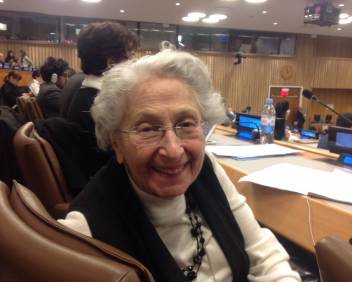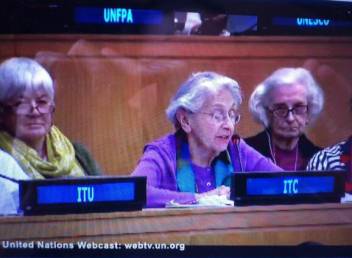 I wanted to share news from New York, and write about our friend and colleague, the totally inspirational Helen Hamlin. An activist for the rights of older people and herself 91, Helen addressed the United Nations (watch from 01.30.20) on 2 April on behalf of the Stakeholder Group on Ageing.
I wanted to share news from New York, and write about our friend and colleague, the totally inspirational Helen Hamlin. An activist for the rights of older people and herself 91, Helen addressed the United Nations (watch from 01.30.20) on 2 April on behalf of the Stakeholder Group on Ageing.
HelpAge International is one of a number of organisations within this Stakeholder Group, others are AARP and the International Federation on Ageing.
We have all come together as a single ageing community to jointly advocate at the UN in New York, brought together by our shared determination to achieve the best possible outcome in the post-2015 process for older women and men.
This is a big challenge, given the unprecedented speed of demographic change and population ageing. Ageing and older people have not historically been on the agenda of those determining frameworks such as the Millennium Development Goals, but there are grounds for cautious optimism that the message is starting to get through.
Encouraging action on ageing
HelpAge International have invested heavily in the post-2015 process, with this being a priority for our policy and advocacy teams for some time. We have had a particularly intense period of advocacy in New York since December, led by Sylvia Beales, who I have twice joined there for a series of meetings, in December and February.
HelpAge is committed to working in New York as part of this broader group of individuals and organisations working on global ageing, and we are proud to be part of such an effective and passionate group.
Over the past year, this Stakeholder Group on Ageing has been meeting UN Missions to influence the discussions happening at the UN. The group is working particularly effectively with the major groups of women and children and youth, and us developing a programme of work with the business group and with those working on disability.
We are working within this group to deepen and strengthen our efforts to raise awareness and encourage action on ageing across the United Nations and Member State delegations, and the strategy really seems to be working.
Dare we dream?
Experience has unfortunately taught us to remain cautious, but there are certainly grounds for optimism recently that the next international framework, known for now as Sustainable Development Goals, may contain language explicitly designed to be more inclusive of all age groups. This framework is critical, and will shape aid planning and indeed spending over the next 15 years.
As some of you will know, our recent optimism is based on the fact that the most recent communication on the “Focus Area of the Sustainable Development Goals” document developed by the Open Working Group on Sustainable Development (OWG) had a number of specific references to ageing and older people, and reflected inputs that we have been giving to ensure ageing is in the post-2015 framework.
Some examples are:
- “providing social protection […] to reduce vulnerabilities of the poor, including children […] and older persons;”
- “providing for the health needs of persons with disabilities, youth, migrants, and ageing populations;”
- “ending all forms of discrimination against women of all ages;
Discussions are now going on to shape the report that the UN General Secretary and Member States will discuss in September, which will be the basis for the final set of Sustainable Development Goals.
Keep the momentum up!
As the HelpAge Global Network we must keep up this momentum. It’s been fantastic to hear about Affiliates in a number of countries calling on their governments for ageing to be addressed by the SDGs.
Last week alone, 12 Affiliates took action on this very important agenda!
It’s working like this that gives us the best chance of achieving the changes we want to see. Please keep the momentum up, and let us know what we can do to support you.
Helen Hamlin’s statement
 Helen has been working on ageing for much of her life, as a professional and volunteer. She has represented the International Federation on Ageing at the United Nations since 1991 and has been a social worker for nearly 60 years, specialising in gerontology for the past 40. Helen is also on the Board of several social agencies devoted to services for older people.
Helen has been working on ageing for much of her life, as a professional and volunteer. She has represented the International Federation on Ageing at the United Nations since 1991 and has been a social worker for nearly 60 years, specialising in gerontology for the past 40. Helen is also on the Board of several social agencies devoted to services for older people.
The women’s group was asked to organise a civil society session, and accepted our request to have a dedicated statement on ageing and the post-2015 framework.
The statement was very positively received and was loudly applauded. It seemed to really strike home for many people; members of delegations, the Co-Chairs of the Open Working Group negotiations, UN officials and civil society reps who work with youth, children, people living with disabilities and so on.
You can watch her statement on the UN website – it is inspiring (watch from 1:30:20). Here is what she said:
“My name is Helen Hamlin. I am here representing the Stakeholder Group on Ageing which represents a number of global networks working on ageing, and which works shoulder to shoulder with older people and youth across the world.
“We commend and congratulate the Open Working Group chairs and Member States for the the breakthrough inclusion of population ageing and older people in the focus group document. We urge you to continue and deepen this dialogue as you move your discussions forward.
“The post-2015 framework is being developed at a time of major demographic change. The SDGs must reflect the reality of the world as we find it. We are all ageing. By 2030 older people will constitute 16% of the world’s population and those over 60 will number more than those aged under 10. Women 50 and over already make up over 21% of the women of the world. The opportunities and challenges of increased longevity are pertinent to the present youth bulge as well the current and future age bulge. Inequality and poverty in later life are directly related to inequalities of opportunity experienced when young.
“This is why the post-2015 framework must support a society of all ages, for all ages. Youth and older persons agree that the framework must be based on international human rights standards and principles, including universality, non-discrimination, equality, participation, empowerment and accountability.
“We also agree that a monitoring framework is needed for the collection and reporting of progress for people of all ages. Disaggregated data is needed to fully understand the global changes in age structure encompassing both the ‘youth bulge’ and the current and future ‘age bulge’, with its opportunities and challenges.
“Therefore we recommend the following:
“1. The framework must have an overarching social protection goal which ensures ‘all persons have social protection coverage during the life‐cycle’, as recommended by the ILO. This can be achieved through the extension of social security guarantees to all people, including older people, as part of comprehensive floors of social protection. Rights based social protection plays a key role in tackling poverty and inequality. Poverty is a core concern for people in older age and programming should be based on age-disaggregated data. Only 50% of older people globally have access to a pension and only 17% in least developed countries.
“2. We support the health goal which stresses improving healthy life expectancy and maximising health from the cradle to the grave. This can be achieved through universal health coverage and prioritising the prevention and treatment of NCDs and CDs across the life span including HIV, TB and malaria.
“3. We support a standalone gender equality goal inclusive of women of all ages, which tackles discrimination, violence and abuse throughout their lives, including the protection of assets, property and inheritance rights. Gender must also be mainstreamed throughout the SDGs.
“4. Any goal on food security must be inclusive of people of all ages in line with the right of all human beings to live free from hunger, food insecurity and malnutrition. In a context where more than 70% of economically active people aged 60 and over in sub-Sahara Africa and Asia are engaged in agriculture, older people should be recognised for their contribution and included in all efforts to achieve this goal.
“5. The framework should deliver to persons of all ages and abilities economic and personal security, education opportunities across the life course, guarantees of decent employment and an environment that enhances participation, active citizenship and freedom from age related discrimination across the life course.
“We urge Member States to recognise the realities of an ageing world that is also intergenerational. We urge you to maintain and secure the language on people in older age as discussions progress. The post-2015 framework must be inclusive of people of all ages and ensure accountability to all across the life course.
“This requires attention to improved data that is disaggregated by age, sex and other factors and understanding of the diversity of these groups their intersecting issues and the impact of discrimination and inequality. This is why we call for a ‘data revolution’ that both uses existing data sets and also adjusts data systems to ensure those aged 50 and over are fully captured and age data gaps are filled.
“The principle of ‘leaving no one behind’ means that no goals or target can be met unless it is shown to be met by all groups and must include age.”
Many people came up to Helen to thank her for her words. Some asked her for the secret of her vitality, passion and articulate engagement and hoped they would be the same as her at 91. Helen responded “keep busy” and advises to all “listen up guys, this is important for you, hear it, take it in!”
Let’s take Helen’s words on board and use them to inspire us all in our work!
Find out more about our work to ensure older people are included in the post-2015 framework.
